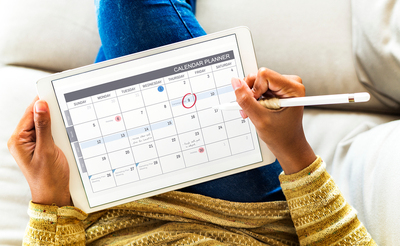 If you want to have a successful social media strategy for your business, there's one thing you just have to do. That's to plan ahead. This is why it's so important to create and maintain a content calendar for your business's social media platforms.
If you want to have a successful social media strategy for your business, there's one thing you just have to do. That's to plan ahead. This is why it's so important to create and maintain a content calendar for your business's social media platforms.
Trying to manage your social media without building a content calendar and planning your content out ahead of time fails to incorporate any kind of strategy. It's essential to be strategic about your content types and what you're sharing, and the best way to do that is by building a content calendar.
Let's go over the steps you need to take to get started creating your own social media content calendar.
1. Define your timeline.
How far in advance do you want to plan and schedule content? If you're in an industry that doesn't change quickly or have breaking news often, you have the advantage of being able to plan for a longer period of time. Industries that are constantly changing and evolving (like ours in the digital marketing world) have to create content more often to keep on the cutting edge of things.
Although fast-paced industries may need to plan a week at a time, some industries can plan a month or two of content all at once. Sit down with your marketing team or agency to determine the best timeline for your business.
Once you've defined your timeline and you know how often you'll need to sit back down and create new content, set aside time to get started on your social media content calendar.
Remember that this is for your everyday content. Any large events or webinars that your business is hosting, taking part in, or planning can be added into the content rotation as soon as you have dates. Since it's unlikely that the information surrounding your event will be changing, you can go ahead and create/schedule content up to the event or webinar, even if it's six months out.
2. Gather your assets.
What types of content are you going to be sharing? From where will you be sharing content? Gathering your assets and having a basic idea of the content you're going to create is step number two.
A few places from which you might share content include:
- Your blog
- Your website
- Your landing pages
- Your podcast
- Your webinars
- Your case studies
Gather up the rest of your assets as well. This includes:
- Graphics
- Photography
- Videos
- Infographics
- Any other resource you may want to share
You can also gather curated content, including user-generated content (photos that your customers have posted using your product/service, links to articles from other industry experts, and more).
Pooling together all of your content sources is a great way to make it easy when you start to actually create your content.
 3. Create patterns.
3. Create patterns.
When creating social media content, it's a great idea to create patterns or themes within your content. Not only does it make content creation easier for you, but it also gives your followers a sense of consistency, in that they know what to expect. In fact, it can even create an episodic reaction, where people are looking forward to seeing what your next post is.
This can be something like #TipTuesday, where you share a new useful industry tip each week, or #FridayFun where you share a funny meme that's relevant to your business/industry.
You can also create patterns within your content, like sharing a link, a photo, then a graphic, and repeating it over and over again or sharing your new blog posts every Monday and Friday.
Creating some type of pattern helps you to easily create content. You know what kind of content you need and when you need it. If there are multiple people involved in content creation, it can also help give everyone peace of mind because they know what needs to come next.
4. Create your content.
There are a few different ways to utilize a content calendar. You can print one out and write out your content ideas/patterns before creating and scheduling your content online. You can utilize Google Docs or Dropbox Paper to create a content calendar as you go, writing out dates, creating your captions, and pasting photos and/or links directly underneath.
This digital route is a favorite of ours because it allows you to store old content to utilize easily and makes for a much quicker scheduling process.
Once you've settled on a type of content calendar, it's time to get down to business.
First, take a look at any holidays, events, or fun social holidays (i.e., National Coffee Day) that are important or relevant to your business and create content for those. Then focus on your content pattern or themed days to fill in the rest of your content, sharing blog posts, industry news, photos, graphics, and more.
Create engaging content that interests your audience and makes them want to interact with your business online.
5. Schedule your content.
For the final step, schedule your content. Facebook gives business pages the ability to schedule directly in the platform, but you'll have to use a third-party scheduling app for the other platforms. Buffer, Hootsuite, and Sprout Social are a few of the most popular scheduling apps from which to choose.
Scheduling your content allows you to create it ahead of time and not have to worry about posting every single day. That way you can focus on other important things, like running your business and doing the tasks that are actually generating revenue.
If you are in need of great social media content, you have another, easier option. You can simply hand off social media content creation duties to a digital marketing agency like Connection Model. To get more information about how we can help your business, request an assessment.
Written By: Doug Milnor


